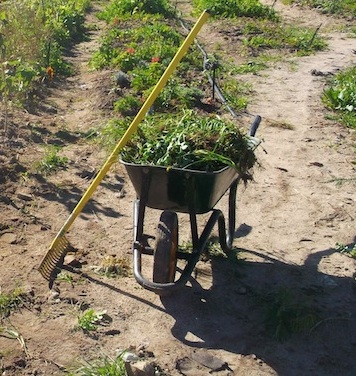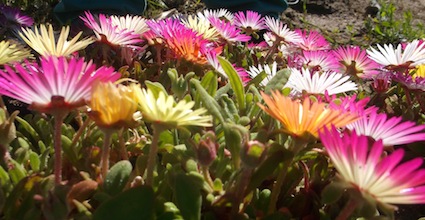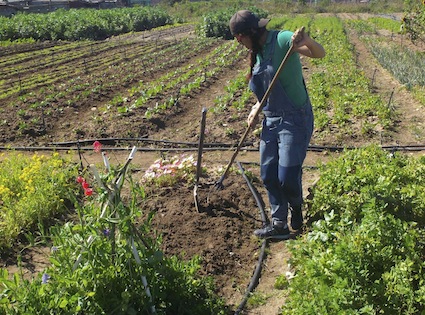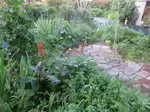Dear Reader, in this age of AI created content, please support with your goodwill someone who works harder to provide the human-made. Sign up at the top of the lefthand column or bottom of this page. You will receive my hand illustrated monthly newsletter RESTORE NATURE and access to the biodiversity garden design course as I write...and nothing else, I respect your time. I am also removing the advertizing as best I can as its become intrusive inappropriate and pays me nothing.
have we come to A FORK IN THE path ?
biodynamic, organic AND permaculture FARMS

handwork on an organic farm
It will take some explaining to show how my position on organic farming, biodynamics and permaculture has changed.
Firstly, I’ve taken it on, as a form of activism, to write about NGO’s, personalities, enterprises and projects that are ‘green’ in Cape Town, to illustrate the wide scope and possibilities of startups, employment, volunteer involvement, activism and spiritual satisfaction to be found in the ‘green’ sector of the economy so that it can grow in this so very ungreen land. In order to cover the full range of ideologies involved and be friendly with everyone, I hoped
to remain neutral on green ideology, and to reflect what people tell me about what they do.
Until I came into closer contact with organic farming, I had the thought that organic, biodynamic and permaculture all were siblings and the overlap was more significant than their differences. Although this is true in some respects, there are fundamental differences. After visiting an organic farm in Phillipi, I had to read up on biodynamics and as I

flowers planted for beauty and to attract bees on an organic farm
read, I found my own ideology aligning itself more closely with permaculture, which surprised me. I believe that organic farming - biodynamics and permaculture are anything but identical and I have organic-biodynamic farming exposure to thank for this.

Let us compare chemical farming, and horticulture, organic farming and biodynamics, and permaculture, by foundational principles as promulgated by producers of ideology, in the persons of Justus von Liebig, and my Technikon South Africa lecturers on soils back in 2005, and then the 'founder' of biodynamics Rudolf Steiner, and proponents of permaculture like Jeff Laughton. All these forms of culture advocate extensive use of manures. In contrast to the generalizing statements against chemical farming, one is taught in commercial horticulture, and Justus von Liebig himself underlined this, that the use of manures should be mandatory in farming. Indeed, according to current market driven horticulture education, so called chemical fertilizers are useless and cannot be absorbed by plants without a significant humic content in the soil. The “artificial chemical nutrients” need to be added in minimal quantities in order not to produce toxic effects from over supply, which we also learned about, and learned to identify toxic conditions and deficiencies by the appearance of the leaf. Farmers who toss chemicals on their fields so that the excess drains into river systems are not conforming to either the principles of Justus von Liebig or taught agriculture. It is bad practice in all given forms of culture.

Modern horticultural cultivation is based on the elimination of “weeds” and “pests” and the addition of manure and traces of artificial chemical nutrients made in a laboratory, if it is good practice. Biodynamic and or organic culture is quite similar in that it is often monoculture based, requiring the elimination of other plants, or weeds, and the addition of manures and traces of herbal based mixtures and additives made on site, which may be like homeopathic preparations. In both, the visible signs of cultivation are not that different, it is only in the additives which cannot be seen with the naked eye once they are in the soil, that there is difference. Traces of chemicals on the one hand, traces of water-memory on the other. “Chemical” poisons on the one hand, and “natural” or plant poisons on the other, some of which like pyrethrum which is allowed in organic farming, being a nerve poison also toxic to humans.
Burying a cow horn full of crystalline silica in a field does no harm, but I do think some biodynamic farmers probably adhere to soil management practice that is confusingly similar to that of ordinary chemical farming, and yet is obviously and visually very dissimilar to permaculture. Weeding so much, and not mulching, leaving the naked baking earth under the African sun, and the consequent loss of topsoil are common to both biodynamic and chemical forms of culture. The loss of soil on the organic farm is a danger, and this could be averted by mulching. Mulch like wood chips does work and does not make plants sick if it is well rotted and has the correct C:N ratios. Technikon students, as an example of mainstream horticultural practice, also learn about the C:N ratios in compost and that very high C mulches, like wood chips, will absorb nitrogen from the soil as they degrade, leading to a temporary nitrogen deficiency in the soil. Use well rotted mulch and all will be well. The top soil will be saved, nutrient retention and stability of soil moisture will improve, and there should be less water loss due to evaporation, as well as less weeding.

clean soil and lines, and nitrifying crops
Both chemical farming and biodynamics or organic farming that avoids mulching, have similar effects on soil. Both suggest that man can do better than millions of years of evolved natural process. Mulch allows natural processes to add humus, trace elements, effective microorganisms to the soil, and improve its quality for plant growth in multiple ways to do with structure and retentive and drainage properties.
When you look at the birth of the various forms of plant culture, Justus von Liebig in the early 19th Century and biodynamics in the early 20th, and the fact that biodynamics under Rudolf Steiner was the earliest form of reaction to chemical farming, it is no wonder that they resemble each other so much. They appear identical on the surface, except in the realm of the invisible, the microscopic or the molecular.
Mulch is more often criticized in damp countries. In cold, wet zones of the earth where there is a greater danger of fungal pathogens, some farmers and gardeners feel that the mulching is not productive. In hot dry South Africa, and Australia, saving water, and buffering the drying out process of the sun should have higher prevalence. Applying one ideology against mulching globally, because of the small danger it presents in wet countries is not place or eco sensitive.

mixed planting on a biodynamic farm
is organic farming really that different to permaculture ?
Organic agriculture defines the farm as an organism and is more ecologically sensitive than chemical agriculture. In its most generic use, the term signifies the use of organic rather than artificial substances on the farm as soil additives, pesticides and coverings. In this latter sense, organic produce is highly regulated, so much so that many farmers refuse to have themselves certified, and that is understandable but also abusable. However the term is really polysemic and also aligns itself through its first usage with the spirituality of biodynamic processes, thus overlapping entirely in some definitions of this meaning of organic, going beyond the mere materiality of the substances used.
Permaculture, on the other hand, does not rely only on mystic knowledge, although some proponents of it do. Permaculture represents the best of both worlds, with deep understanding of the natural and, if you so wish, can incorporate elements of super natural knowledge systems too.
Permaculture's main drive seems to be ecological sensitivity and the mimicry of ecological systems. It constitutes a huge advance in ecological thinking from both biodynamics, organic farming and chemical culture, in its lack of tillage, and its lack of rigid and mystified practices, its flexibility and adaptability, and its intense preoccupation with protection of the soil and regenerative mechanisms. It must, from a purely historical point of view, following the way ideas in many fields develop, constitute some form of reaction to the previous pre WW2 'natural' farming methods like biodynamics. Most of the theoretical content of permaculture has visible results and its methods are accessible to reason, and have practical explanations, though it has faddish elements, but that is a subject for another page altogether.
Organic farming is defined far more by the internal purity of the product, and permaculture by the visible, corporeal practice.

I found that organic farmers claim that permaculture cannot mass-produce, and is too labour intensive with its scattered mixed plantings and is thus not sustainable as a way of producing food for a huge urban population. I was really convinced that permaculture was only suitable for little gardens, but in the interim, encouraged to read, I’ve watched a Jeff Laughton video which features the permaculture school farm. It appears to quite productive and larger in extent than many an organic farm I’ve seen to date, and the plantings are in rows that show mass production of the same vegetable variety too. In superficial appearance the extensive planting of Jeff Laughton’s farm is like any other market garden, except for the closeness of growth in the rows, with different rows of different kinds, and the obviously thick layer of compost on the soil. It appears the argument that permaculture is not productive, is founded on small garden practice, and not on farming.
To conclude, a comparison of organic and permacultural farming practice forced
me into ideological engagement because although I'd say organic farming is 'better' than chemical farming, permaculture, or a commercially adapted form of it suited to mass production, is better than organic farming. This is considering factors like soil erosion and environmentally conscious, ethical, effective methods. I'm definitely
pro permaculture if there has to be any segregation, for the time being. I’m
flexible and new or contradictory evidence can change my opinion. I have to reason that the soil management philosophy of
permaculture is superior to anything that has preceded it in the
last two hundred years, whether or not there are other weaknesses.
However, on a well run organic-biodynamic farm like the one I visited in Phillipi, practice assures the consumer of organic products safe to eat, without genetic modification, or the residues of herbicides, insecticides or the by products of artificial fertilization. It is thus in the realm of the invisible parts of our food, that organic farming is hugely superior to commercial chemical farming, that and the extra labour that has been invested in using natural methods to produce what is basically a handcrafted product for human consumption.
It was very educational and also a lot of fun to volunteer on the farm at Phillipi, and I wish the farmers abundance and pleasure in work. Anyone can volunteer, and I'd highly recommend it. See the link below to find out more.

a volunteer on the farm at phillipi
------
home page for green inspirations and links
------
vegetable gardening the natural low cost way
------
------
Restore Nature Newsletter
I've been writing for four years now and I would love to hear from you
Please let me know if you have any questions, comments or stories to share on gardening, permaculture, regenerative agriculture, food forests, natural gardening, do nothing gardening, observations about pests and diseases, foraging, dealing with and using weeds constructively, composting and going offgrid.
SEARCH
Order the Kindle E-book for the SPECIAL PRICE of only
Prices valid till 30.09.2023
Recent Articles
-
garden for life is a blog about saving the earth one garden at a time
Apr 18, 25 01:18 PM
The garden for life blog has short articles on gardening for biodiversity with native plants and regenerating soil for climate amelioration and nutritious food -
Cape Flats Sand Fynbos, Cape Town's most endangered native vegetation!
Apr 18, 25 10:36 AM
Cape Flats Sand Fynbos, a vegetation type found in the super diverse Cape Fynbos region is threatened by Cape Town's urban development and invasive alien plants -
Geography Research Task
Jan 31, 25 11:37 PM
To whom it may concern My name is Tanyaradzwa Madziwa and I am a matric student at Springfield Convent School. As part of our geography syllabus for this
"How to start a profitable worm business on a shoestring budget
Order a printed copy from "Amazon" at the SPECIAL PRICE of only
or a digital version from the "Kindle" store at the SPECIAL PRICE of only
Prices valid till 30.09.2023







